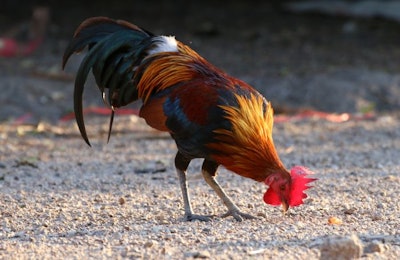
Three further outbreaks of highly pathogenic avian influenza (HPAI) have been confirmed in Mexico.
According to the latest report from the national animal health agency, Senasica, to the World Organisation for Animal Health (OIE), all the cases were in backyard flocks of fighting birds. Outbreaks were confirmed between September 30 and October 8.
As with recent outbreaks, the premises were all in Lagos de Moreno, a municipality in the Altos Norte region in the north-east of the state of Jalisco. In each case, mortality rates were elevated, and the birds showed typical symptoms of the disease including cyanosis, edema and swelling of the comb and wattles. The presence of the H7N3 variant HPAI virus at each location was subsequently confirmed.
Impacts on commercial poultry production in Mexico
These latest cases bring the country’s total HPAI outbreaks since March this year to 33, and direct losses to almost 1.034 million poultry.
Despite these outbreaks, HPAI is not reported to have had a significant impact on the nation’s commercial poultry sector so far this year.
Poultry farming is an important sector for Mexico, according to Secretary for Agriculture, Víctor Manuel Villalobos Arámbula. At the opening of the recent National Poultry Congress, he said the country ranks 6th in the world for poultry meat production, and in 4th place in egg output.
Most important states for poultry meat production in Mexico, he said, are Aguascalientes (350,000 metric tons, mt), Durango (280,000mt), and Guanajuato (200,000mt). Top egg-producing states are Guanajuato (80,000mt), Durango (60,000mt), and Coahuila (45,000mt).
The agriculture secretary said that the national agri-food safety service, Senasica, has been carrying out the timely monitoring of avian influenza, and applying control measures to stop the spread of the infection.
More HPAI cases in Taiwan
Taiwan’s Council of Agriculture has informed the OIE about one new outbreak of HPAI linked to the H5N2 virus subtype.
Latest cases were in a flock of 1,201 meat ducks in Mailiao, in the county of Yunlin. The presence of the virus was confirmed before any of the birds died, but the flock was destroyed. This was the 41st HPAI outbreak in the county so far this year, according to the official reports.
H5N8 HPAI detected in another South African ostrich flock
For more than 2 years, the commercial ostrich sector in South Africa has been battling the H5N8 variant of the HPAI virus.
Recent testing has revealed one virus-positive bird out of a flock of more than 3,100 birds in Western Cape Province. The most recently previously reported cases were in the same province in June of this year.
South African authorities continue to monitor wild birds for the same virus variant. The latest report from the agriculture department to the OIE indicates no new positive findings since a number of geese in early July of this year.
Concerns over avian influenza in South Korea
Suspected cases of avian flu have been detected in the cities of Gimcheon and Anseong, reported Yonhap last week. Authorities say that viruses of the H5 subtype were found in wild bird droppings at each location. The samples are being investigated to assess the pathogenicity of the virus for poultry.
Located in North Gyeongsang province, Gimcheon is around 230 kilometers south of Seoul. Anseong is around 80 kilometers south of the capital in Gyeonggi province.
Earlier in October, a low-pathogenic avian influenza virus was detected in wild bird droppings in Asan, which is in South Chungcheong province, and in the metropolitan city of Gwangju.
View our continuing coverage of the global avian influenza situation.

















